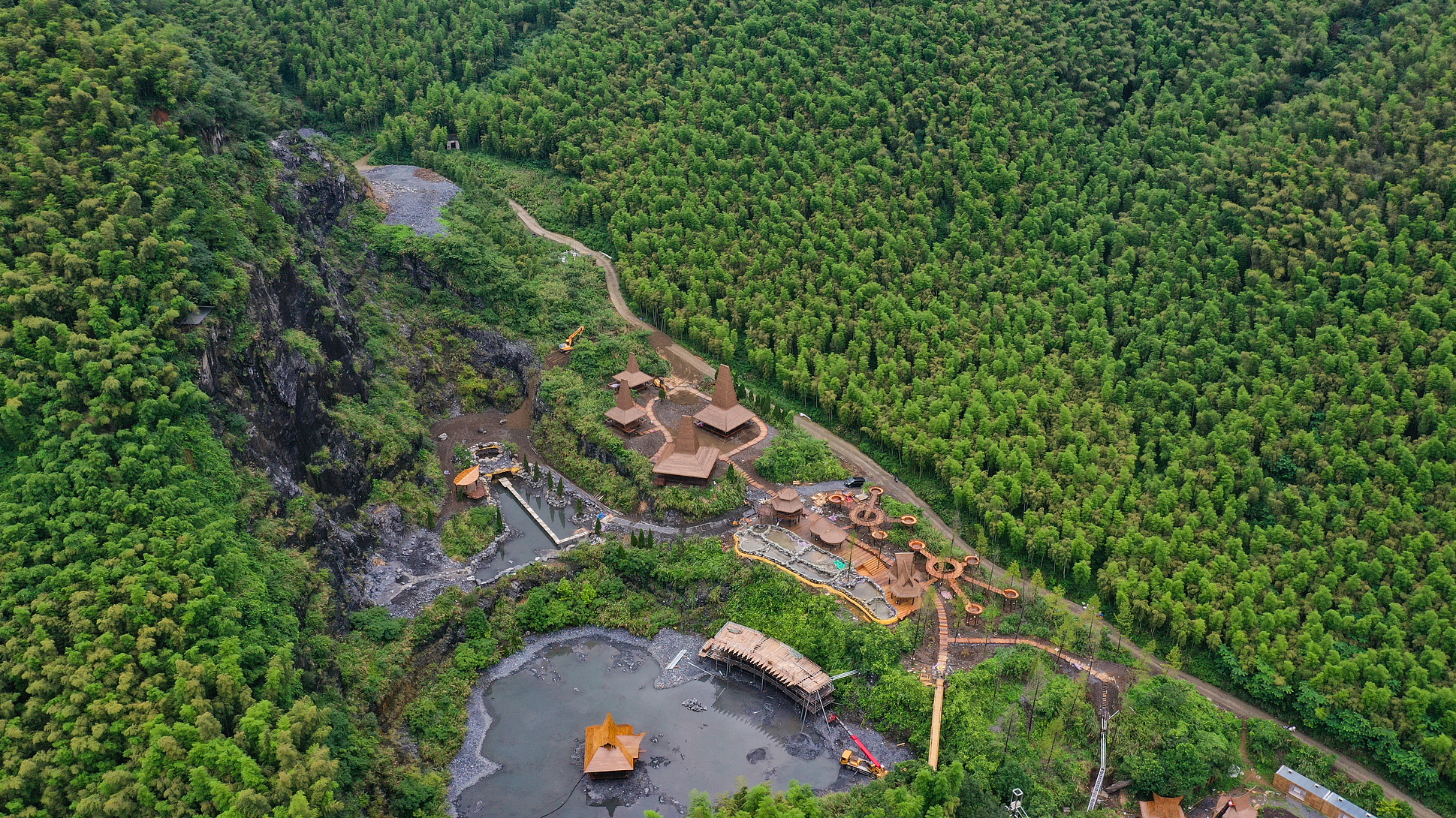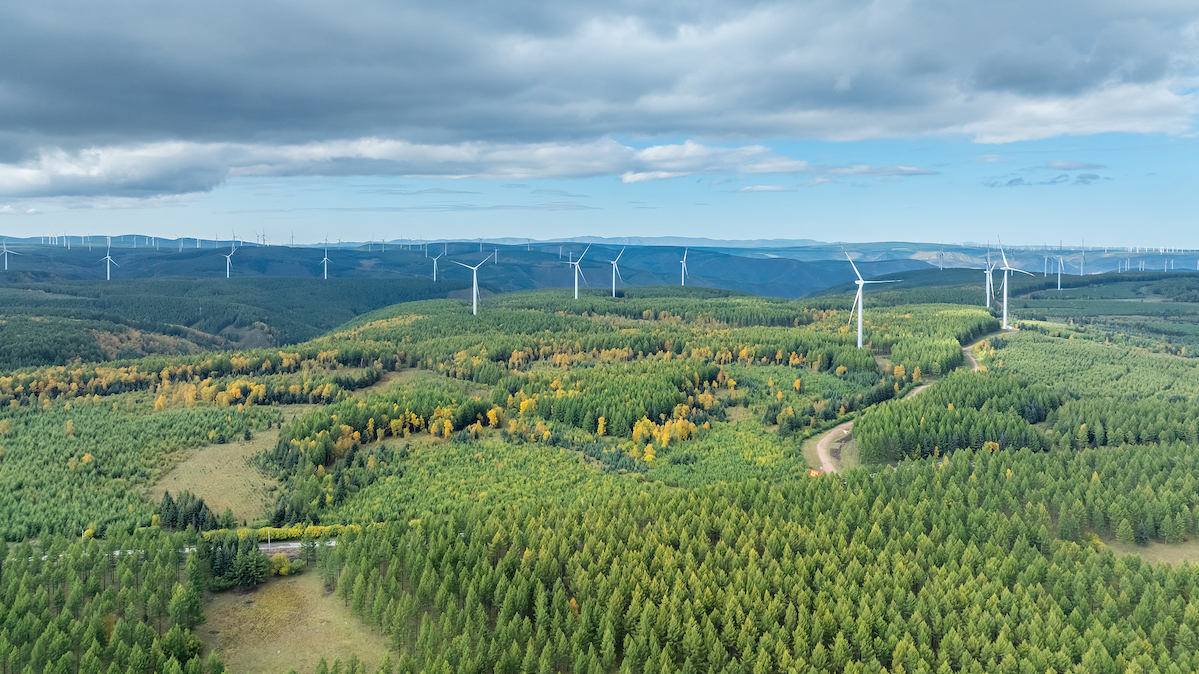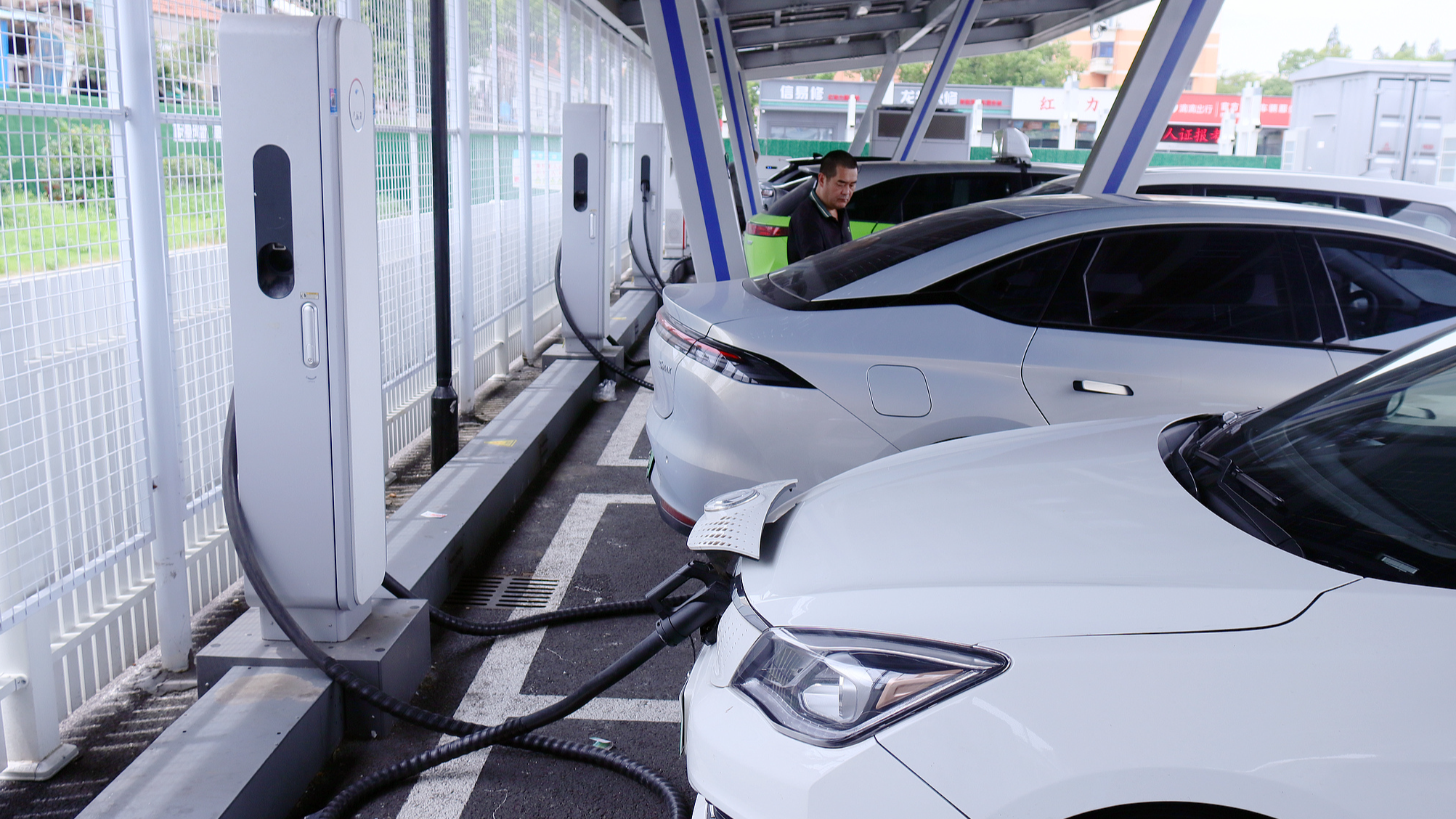Lucid waters and lush mountains are invaluable assets.
- Xi Jinping

A bird's-eye view of a coffee flagship store, which was transformed from an abandoned mine pit, at Yucun Village, Anji County, in Huzhou City, east China's Zhejiang Province, July 27, 2025. /VCG
Once blanketed in quarry dust, Yucun Village in east China's Zhejiang Province is now celebrated for its crystal-clear waters and verdant mountains – earning a place among the world's best tourism villages.
In the 1980s, villagers blasted mountains to mine high-quality limestone for cement production. While incomes rose, the environment paid the price.
Recalling how the environment was severely damaged and locals saw no way out at that time, Hu Jiaren, former secretary of the Yucun Village Committee of the Communist Party of China, told CGTN that then the village committee stepped in and gave them guidance.
After learning from other regions, officials made a bold decision: shut down the mines and develop a leisure economy. "In the past, we used to quarry and sell stones. Now the village focuses on tourism. We are selling the scenery," Hu said.
On August 15, 2005, Xi Jinping, then secretary of the Zhejiang Provincial Committee of the Communist Party of China, visited the village. "It is a brilliant move for you to shut down the mines," he said.
It's during this visit that Xi for the first time put forward the concept of "lucid waters and lush mountains are invaluable assets."
For locals like Pan Chunlin – once a tractor driver in the mines – the shift from mining to tourism was life-changing. In 2005, Pan opened Yucun's first guesthouse. "We were miners; now I own a small business and lead a team of colleagues working hard together," Pan told CGTN.
Today, where dust once choked the air, vibrant rice paddies sway beside sunflower fields, and old cement factories have become stylish countryside cafés.
In 2024 alone, Yucun Village welcomed 1.22 million tourist visits, achieving a collective economic income of 22.05 million yuan (around $3.1 million). With over 1,000 villagers, the per capita income hit 74,000 yuan, while annual dividends per person surged from 600 yuan in 2020 to 3,000 yuan – a fivefold increase.

The Saihanba mechanized forest farm in north China's Hebei Province. /VCG
Greener China
The path of green development is correct and should be followed, Chinese President Xi Jinping said when learning about the huge changes brought about by advancing green development in Yucun Village during his visit to the village on March 30, 2020.
Across the nation, the belief that "lucid waters and lush mountains are invaluable assets" has become a shared commitment, inspiring efforts to curb pollution and restore ecosystems.
According to the Ministry of Ecology and Environment, the proportion of surface-water bodies nationwide classified as having excellent water quality reached 90.4 percent in 2024, marking the first time this figure exceeded 90 percent. Meanwhile, the average density of PM2.5 in Chinese cities at or above the prefecture level stood at 29.3 micrograms per cubic meter in 2024, down 2.7 percent year on year, meeting the air quality standard for the fifth consecutive year.
Besides, data from National Forestry and Grassland Administrations showed that China planted 4.45 million hectares of trees in 2024, raising the country's forest coverage to over 25 percent, with total forest stock volume exceeding 20 billion cubic meters.
These ecological gains are delivering real income boosts. In central China's Xinyang City, for instance, forest coverage in the Dabie Mountains foothills has risen from 50 percent to 70 percent thanks to the country's long-term program of returning farmland to forest. A new "bird-watching economy" now adds over 20,000 yuan a year to local villagers' incomes.

New energy vehicles are charging at a public parking lot in Changzhou City, east China's Jiangsu Province, August 9, 2025. /VCG
Pushing for green development
While emphasizing ecological and environmental protection, China in recent years has also enhanced its efforts in green transition and developing green industries.
Renewable energy expansion in China continues to set new records, with over 200 million kilowatts of newly installed capacity for renewable energy power generation in the first three quarters of 2024, accounting for more than 80 percent of total new installed capacity, said Zhang Xing, spokesperson for the National Energy Administration.
In 2023, China accounted for 60 percent of the new renewable capacity added worldwide, according to the International Energy Agency's World Energy Outlook 2024.
China has also introduced a series of measures specifically guiding green development. For example, more than 100 billion yuan of central budgetary investment has been allocated to support the construction of environmental infrastructure and promote the industrialization of green technologies.
Besides, China approved an action plan for advancing the green and low-carbon development of manufacturing (2025-2027) in May to accelerate the green transformation and upgrading of key industries. Meanwhile, nationwide programs encourage energy-saving equipment upgrades and "trade-in" policies for households and businesses.
The number of new energy vehicles (NEVs) in use in China reached 31.4 million by the end of 2024, according to the Ministry of Public Security. Noting the figure marks a 260-fold surge over the past decade, the ministry said the country's technological progress in the NEV industry is one of the reasons behind the rapid development.
China has also been sharing the fruits of its achievements globally, helping other countries go green. This has particularly been the case in supporting sustainable development across Africa, the Arab region and the broader Global South.
The Gouina Hydropower Station in Mali – built by PowerChina and launched in 2022 – generates 620 million kWh of clean electricity annually, supplying power to 1 million residents across Mali, Senegal, and Mauritania. The plant replaces roughly 240,000 tonnes of coal and cuts carbon emissions by 630,000 tonnes each year, transforming West Africa's energy landscape.
阅读原文:https://news.cgtn.com/news/2025-08-13/How-China-turns-its-green-into-gold-1FNXITRSeTS/p.html